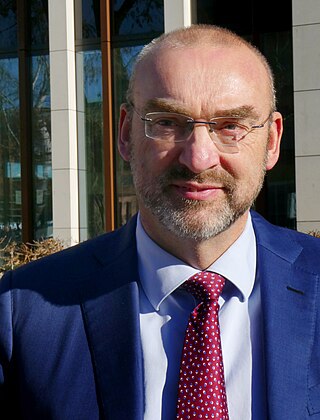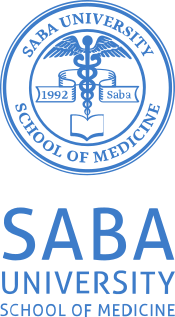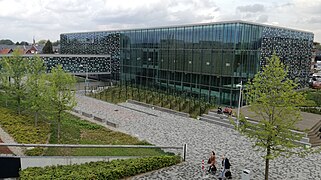
Ede is a town and municipality in the Netherlands, in the province of Gelderland. As of 1 July 2021, Ede had 119,186 inhabitants.

Avans University of Applied Sciences is a Dutch high ranked vocational university. It is located in three cities: Breda, 's-Hertogenbosch, and Tilburg. The school has over 30,000 students studying 40 courses in 18 institutes. There are 3,000 employees.

Radboud University (abbreviated as RU, Dutch: Radboud Universiteit, formerly Katholieke Universiteit Nijmegen) is a public research university located in Nijmegen, the Netherlands. RU has seven faculties and more than 24,000 students.

Nyenrode Business Universiteit is a Dutch business university and the only private higher education institution that has the university status in the Netherlands. Founded in 1946, it is located on a large estate in the town of Breukelen, between Amsterdam and Utrecht. The educational institution is named after the castle where the course is located: Nijenrode Castle. Nyenrode was founded under the name of the Netherlands Training Institute for Abroad by renowned private Dutch companies, including KLM, Shell, Unilever, Philips, and AkzoNobel, with the objective 'For Business, By Business'. The establishment was the result of an idea from KLM director Albert Plesman.

The Windesheim University of Applied Sciences is a public vocational university in Windesheim, The Netherlands. It was founded in 1986 and it's buildings are an example of modern architecture.

The Maastricht Academy of Music, Dutch: Conservatorium Maastricht, located in the city of Maastricht, is one of nine music academies in the Netherlands. The academy is a faculty of the Zuyd University of Applied Sciences for the Bachelor programme and the "Zuid Nederlandse Hogeschool voor Muziek" for the Master programme, in co-operation with the Fontys Academy of Music and Performing Arts. The academy provides advanced vocational training.
The Dutch National Students Association is one of two national representations and spokesman of students in the Netherlands at the Ministry of Education, Culture and Science, VSNU, Association of Higher Professional Education, DUO, etc. The purpose of ISO is to improve the quality of higher education, protection of students' interests and representation of 688.000 students in higher education.

Roelof (Roel) Kuiper is a Dutch historian, philosopher, ideologue, politician and university professor. He was from 2007 to 2019 a member of the Dutch Senate, and is professor of Reformational philosophy at the Erasmus Universiteit Rotterdam in the name of the Association for Reformational philosophy, teaching Society Issues at the Christelijke Hogeschool Ede and Gereformeerde Hogeschool Zwolle and Political and social philosophy at the Vrije Universiteit Amsterdam (VU).

Fontys University of Applied Sciences is a Dutch university of applied sciences, located in the southern Netherlands. It has over 44,000 students in several campuses. The three largest Fontys campuses are located in the cities of Eindhoven, Tilburg and Venlo. The name Fontys comes from the Latin word "fons" which means "source". Fontys offers 200 bachelor's and master's study programmes in the fields of economics, technology, health care, social work, sports and teacher training. A selection of these programmes are offered in German and English. Independent Dutch university rankings by Keuzegids place Fontys among the top-ranked large universities of applied sciences in the Netherlands. In 2014, former Fontys Chairperson Nienke Meijer was named the "Most Influential Woman in the Netherlands".

Saba University School of Medicine is a private for-profit offshore medical school located on Saba, a special municipality of the Netherlands in the Caribbean. Saba University confers upon its graduates the Doctor of Medicine (MD) degree. It is owned by R3 Education, Inc. Devens, Massachusetts which also owns St. Matthew's University and the Medical University of the Americas
The Accreditation Organisation of the Netherlands and Flanders is the independent educational accreditation organisation for higher education institutions in the Netherlands and Flanders. It was established by international treaty by the Dutch government and the Flemish government in Belgium, for the purpose of ensuring the quality of higher education in the Netherlands and Flanders by accrediting study programmes.

The Evangelical Theological Faculty is an interdenominational Evangelical Institute/University in Leuven, Flanders, Belgium and is recognised by the Federal Government of Belgium to award degrees and doctorates. It is an Evangelical faculty which complements the Faculty of Theology and Religious Studies at the Catholic University Leuven. The ETF offers four degree programs: a Dutch-taught Bachelor of Arts in Theology and Religious Studies program, an English-taught Master of Arts in Theology and Religious Studies program, a Dutch-taught Teacher's degree program, and an English PhD program. Moreover, the ETF also offers a Bachelor's and Master's part-time program named ETF Open University.

Amsterdam University of Applied Sciences is a large vocational university located in Amsterdam, Netherlands. The AUAS mainly offers bachelor's degree programmes, but also has a number of (professional) master's degree programmes. For students from the AUAS' international partner institutes it is possible to study at the AUAS as an exchange student.
The Bachelor of Journalism (B.J.) degree is a degree awarded at some universities to students who have studied journalism in a three or four year undergraduate program. In the United States, some schools that do not award the B.J. degree instead confer a Bachelor of Arts, Journalism (B.A.J.), Bachelor of Arts in Journalism and Mass Communication (B.A.J.M.C.) or Bachelor of Science, Journalism (BSJ) that is often part of or in conjunction with a course of study in mass communication. Yet another epithetological version of the degree, conferred by The Henry W. Grady College of Journalism and Mass Communication at the University of Georgia, is the A.B.J. degree, the Latin equivalent of the B.J./B.A.J.

Inholland University of Applied Sciences is a large university of applied sciences located in eight main cities of the Randstad, the central-western region of the Netherlands and the country's economic, political and cultural hub. With over 37,000 students from more than 100 countries, the university follows the applied sciences mode of education.
Drenthe University of Applied Sciences is a former vocational university in the Netherlands. Located in the province of Drenthe, its departments were scattered across the cities of Assen, Emmen, and Meppel. Since 2008, it is merged with CHN University of Applied Sciences to Stenden University of Applied Sciences.
Wittenborg University of Applied Sciences is a Dutch government accredited private Vocational University established 1987 in the centre of the Netherlands, offering bachelor's and master's degrees - vocational education - at higher level.
The Evangelical Theological Academy is a Dutch interdenominational institute for evangelical theological education, in Zwijndrecht, Netherlands. The ETA was founded in 1985 by five theologically educated evangelical Christians, who were inspired by the growing demand for theological schooling through part-time or distance education.
NOVI University Of Applied Sciences, Dutch: NOVI, is a private Dutch HBO university of applied science located in Utrecht with a branch in Maastricht. NOVI is the oldest Dutch educational institution for research in Information technology. Its roots go back to 1958 when the nonprofit foundation Studiecentrum Administratieve Automatisering (SSAA) was established by several Dutch academics affiliated with the faculty of economics of the University of Amsterdam. The goal was to facilitate the automation of industry in the Netherlands. The SSAA created the first Dutch examination program in the field of administrative information management, the AMBI, in 1964. At the time of its creation, AMBI was the highest qualification possible in the field and the only one on HBO level. The SSAA adopted the name Studicentrum NOVI in 1971.


















